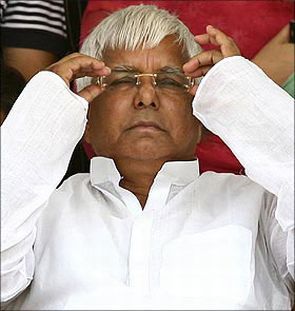 With Lalu Yadav's conviction in the fodder scam case, an alliance between the Congress and Nitish Kumar's Janata Dal-United should have been easier, but that may not be the case.
With Lalu Yadav's conviction in the fodder scam case, an alliance between the Congress and Nitish Kumar's Janata Dal-United should have been easier, but that may not be the case.
Lalu and his militant Yadav clan will not make way for the two parties so easily, says Sheela Bhatt.
In a judgment that has great repercussions for Indian democracy, Lalu Yadav, president of the Rashtriya Janata Dal and the Member of Parliament from Chhapra, Bihar, was found guilty in a corruption case on Monday.
Lalu Yadav is likely to be sentenced to three or more years in prison for siphoning off government funds meant for fodder for animals.
One of India's most maverick and intelligent leaders, Lalu Yadav has already been sent to the Birsa Munda jail in Hatwar, Ranchi.
Justice has been delivered 17 years late, but this is a rare case in which the Central Bureau of Investigation withstood a difficult legal trial for almost a generation.
One's delight in seeing the justice delivery system at work is blighted by the political ground realities in Bihar.
"The taint of corruption will be fought with the Yadav card in the villages of Bihar," says a senior editor in Patna. "The Yadav community feels slighted by the judgment."
Tejaswi Yadav, one of Lalu Yadav's 11 children and the one chosen to be his political heir, made it clear outside the court that his party will expose the 'conspiracy' to imprison his father.
Neither has Bihar Chief Minister Nitish Kumar nor Congress leaders in Bihar unit commented on the judgment so far. Such is the vulnerability of political parties in the state that only the Bharatiya Janata Party has cheered the verdict. The other parties will tread carefully because of Lalu's sway over the Yadav community in the state.
Lalu Yadav will soon rake up Nitish Kumar's name in the case. Prison is unlikely to extinguish his spirit.
The main accused in the fodder scam case, the late Shyam Bihari Sinha, had made a statement, alleging, that in 1994, Nitish Kumar, then in the Samata Party, took Rs 1 crore (Rs 10 million) as election expenditure from individuals involved in the scam; Nitish Kumar's colleague Shivanand Tiwari, Sinha had alleged, took Rs 30 lakh to Rs 35 lakh (Rs 3 million to Rs 3.5 million).
On September 20, Justice R R Prasad asked the CBI why Nitish Kumar and Tiwari had not been made an accused in the case.
With Lalu Yadav discredited, an alliance between the Congress and Nitish Kumar's Janata Dal-United, formal or informal, should have been easier, but that may not be the case.
In Bihar, politics is a serious business and the RJD's militant Yadav supporters will not free the space easily to the Congress or Nitish Kumar.
The Congress has just 2 out of Bihar's 40 MPs and has no hope of getting a respectable vote share in the coming Lok Sabha election. Its organisation in the state is decimated; it is more likely that Lalu Yadav's suporters who desert the RJD will move to Nitish Kumar's JD-U, and not to the Congress.
The newly-formed government in Jharkhand is a coalition government, back by Lalu Yadav's five RJD MLAs. Of these five MLAs, two are ministers.
The Birsa Munda jail in Ranchi had already upgraded its facilities in anticipation of its new VIP occupant.
Before going to prison, Lalu Yadav declared that no one dies in politics. Indian Politics's Great Entertainer may survive in the long run, but today he has been shamed by the Ranchi court.










